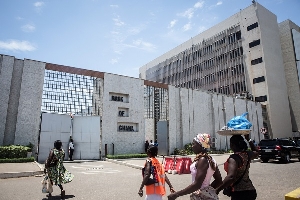African central banks are stepping up uncoordinated interventions in their markets to prop up their slumping currencies and dampen imported inflation.
South Sudan, Mauritius, Nigeria, Zambia and Zimbabwe have together spent at least $400 million since July to defend their currencies, according to data compiled by Bloomberg. Ethiopia, an outlier, plans to hold an auction on Wednesday as it seeks to close the gap between the official and parallel market rate, days after it allowed its currency to float freely.
While central banks routinely intervene in currency markets in Africa, those “interventions become more frequent and at a higher value when you have a terms-of-trade shock,” according to Benedict Craven, the principal economist at the Economist Intelligence Unit.
Factors influencing the size and scope of interventions may include “higher import prices or lower export prices, capital flight, or because inflation is very high and the central bank wants to use the exchange-rate to stabilize the price level,” Craven said.
Last month, Mauritius spent a $150 million to bolster the rupee after it plunged to a record low. The move appears to have helped stabilize the currency. Governor Harvesh Seegolam has assured markets that the bank is ready to intervene and that there’s no shortage of fire power to do so. The bank injected $20 million this week.
Zimbabwe’s central bank also stepped in to support its new currency, the ZiG, short for Zimbabwe Gold, after weakening against the greenback last month in part due to a build-up in demand for foreign currency at banks. It pumped $50 million into the market. The ZiG replaced the defunct Zimbabwean dollar on April 5, which lost 80% of its value against the US currency this year before being scrapped. It is currently being used alongside the dollar.
Given the multi-currency regime which the southern African nation operates in, there should be no surprise that the Reserve Bank of Zimbabwe will intervene, according to Persistence Gwanyanya, a member of the central bank’s monetary policy committee.
“If we have forex demand that can’t be met by voluntary liquidations, the central bank must step in. It has the reserves,” Gwanyanya said Tuesday by phone. The interventions in the interbank market will be “a permanent feature,” he added. “This is the trajectory of where we are going.”
The Bank of South Sudan intervened last week to stabilize its currency, which has lost about a third of its value against the greenback this year because of declining oil revenues, its main foreign-exchange earner. “We have injected something above $8 million” and plan to ensure the intervention is “sustained,” Governor James Alic Garang said.
Nigeria, whose naira is the world’s second-worst performing currency after the Lebanese pound this year, in part due to the central bank ending years of foreign exchange controls in June 2023, has picked up the pace of interventions in recent weeks.
The Central Bank of Nigeria realizes that after years of market dysfunction, “unless it’s playing some role in providing dollar liquidity, it doesn’t have a functioning foreign-exchange market,” said Razia Khan, chief economist for Africa and the Middle East at Standard Chartered Bank. “So the CBN has been both buying and selling foreign-exchange.”
The bank recently sold $148 million to 29 lenders and plans to hold a retail auction on Wednesday to ease pressure on the local currency and deal with growing unmet foreign-exchange demand from businesses seeking to bring in imports and wealthy Nigerians needing to pay foreign school fees.
Such interventions when backed by enough foreign-exchange reserves can be sustainable if the goal is to calm volatility, according to Craven. “If the exchange rate is fixed or managed to an extent whereby it fails to be a signal of hard currency supply and demand then eventually there will have to be a devaluation when exports fall and foreign-exchange reserves run dry,” he said.
Business News of Wednesday, 7 August 2024
Source: bloomberg.com

















